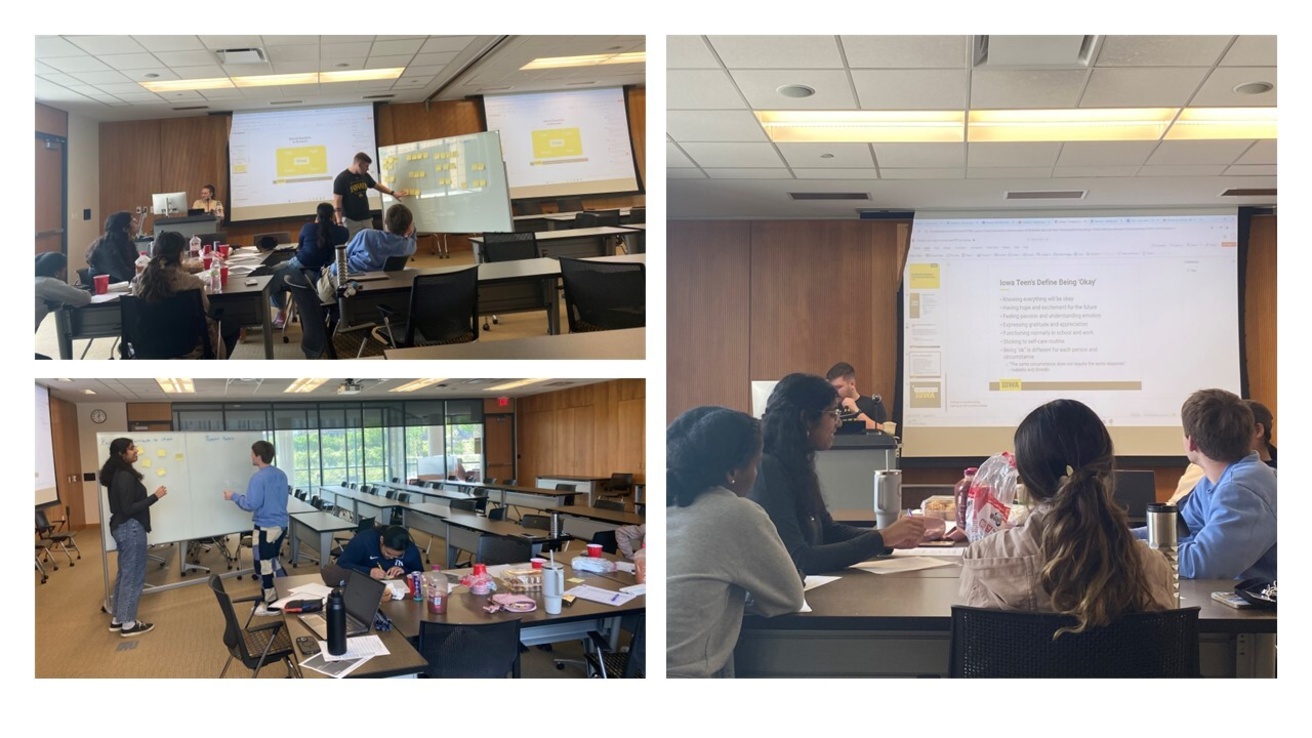CRATERS embeds evidence-based frameworks from:
- positive psychology
- hope theory (Synder, 2002)
- resiliency (Wong & Wong, 2013)
- social support theory (House, 1981)
- coping frameworks (Lazarus & Folkman, 1984)
- crisis response (Cavaiola & Colford, 2018)

CRATERS Module Development
Established Teen Working Group
August 2022Teen working group was established with funding from the Scanlan Center for School Mental Health for a project related to educator capacity building.
- Summer 2023
Teen working group began developing the curriculum for CRATERS.
Curriculum Development
Fall 2023-Spring 2024Curriculum development and capacity building activities during Saturday working meetings at the College of Public Health.
Feedback and Revisions
Spring 2024Received feedback from Iowa teens and began revisions.
Refining and Expansion
Fall 2024Expanded working group to include expertise from middle school students, launched social media account, developed activity workbook, and piloted modules with teens to positive feedback and engagement.
Sharing and Recruitment
Spring 2025Shared process at the Public Health Conference of Iowa and began recruitment for larger pilot after receipt of IRB approval.
Began Recruiting for Pilot of Curriculum
Summer 2025Currently recruiting teens from Iowa to engage in our curriculum.
Awarded GCRU Fellowship
September 2025Awarded GCRU Fellowship from UI Office for Undergraduate Research to support staffing our project.
Pilot
Fall 2025-Spring 2026Currently, we are piloting the curriculum and collecting data on content, process, and outcomes.
Module 1: It's Okay to Not Be Okay
What is Mental Health?
Define and Discuss
Acknowledging Emotions
Feeling Wheel Activity
Mental Health Stigma
STIGMA word recognition activity
Case Study
Recommendations to Address Stigma
What does it mean to be okay?
Reflections from Iowa Teens
Symptoms to Recognize when one is not okay
Module 2: Building Healthy Habits to Promote Hope and Resilience
What does health mean to you?
Define and reflect
What are healthy habits?
Brainstorm and define
Self-reflection
Discuss importance in the context of building healthy habits
The power of hope
Define, find connections between habits and hope, application activity
MARS Framework for building healthy habits with case study activity
Motivation
Action
Resilience
Sustainability
Module 3: Mental Health in Relationships
What is a relationship?
Define and activity-based application
What are different types of relationships?
Boundaries
Define boundaries including how to set boundaries,
ORBIT framework
Open communication
Reciprocal
Boundaries
Inclusion
Techniques
Communication
Define
Describe process of communicating needs in a relationship
Module 4: How to Support Others
Social support
Types of social support
Check-Ins
Prevention and questions to consider
Recognizing Signs and Symptoms
What are they?
Crisis Response
COME-T framework
Check-in
Offer
Monitor
Encourage
Transfer
Required Activities
- Monthly Meetings
- Curriculum Development
- Strategic planning for implementation and evaluation
- Participation/Implementation of integrated curriculum
Products
- Intervention Curriculum & Implementation Guide, Digital and Print Materials
- Pre- and post-test assessment data from intervention delivery with validated tools
Expected Outcomes
- Content creation- prevention messaging; integrated curricula products (content and process)
- Increased Knowledge, Perceptions, Attitudes Self-efficacy, Coping skills, Positive outlook
Outcomes to Date
- establishing and building capacity of a teen working group to engage in youth participatory action research
- mobilizing and mentoring undergraduate and graduate students to gain knowledge and skills regarding youth participatory action research, intervention development, and implementation science
- developing CRATERS module structure, training materials including slides and worksheets, and outlining facilitator guide
Overall Impact
Improved mental health of teens in Iowa

"I think the most sadness I expierience especially as a highschooler is the fear of letting people down or the fear of people thinking I am not trying my best. I think as highschoolers sometimes we get worried that people don’t know that we are putting our best foot forward because of best try one day might be different from our best try another day because of what we are going through. I fear that people will think Im struggling and not give me opportunities as a result.- I get worried that instead of understanding me people will just to stop relying on me."
"I do not think that social media is beneficial to my mental health, so I don’t have instagram or TikTok. This is mostly a precaution because I am aware of the adolescent tendency to compare ourselves to the perfectly framed individuals in those pictures and videos. However, I do have Snapchat—I don’t really use it— because it is a better way to connect with the people that you want to have conversations with, or share little snippets of your lives that are not meant to be perfect."
"At the end of a long day, I think doing simple lifestyle tasks are what making me happy. Cleaning my room after a long day sometimes brings me joy, or filling my waterbottle. Sometimes I read or color. I definitely find joy in small but meaningful tasks however sometimes my mental health can bring me to a point where these don’t seem important."